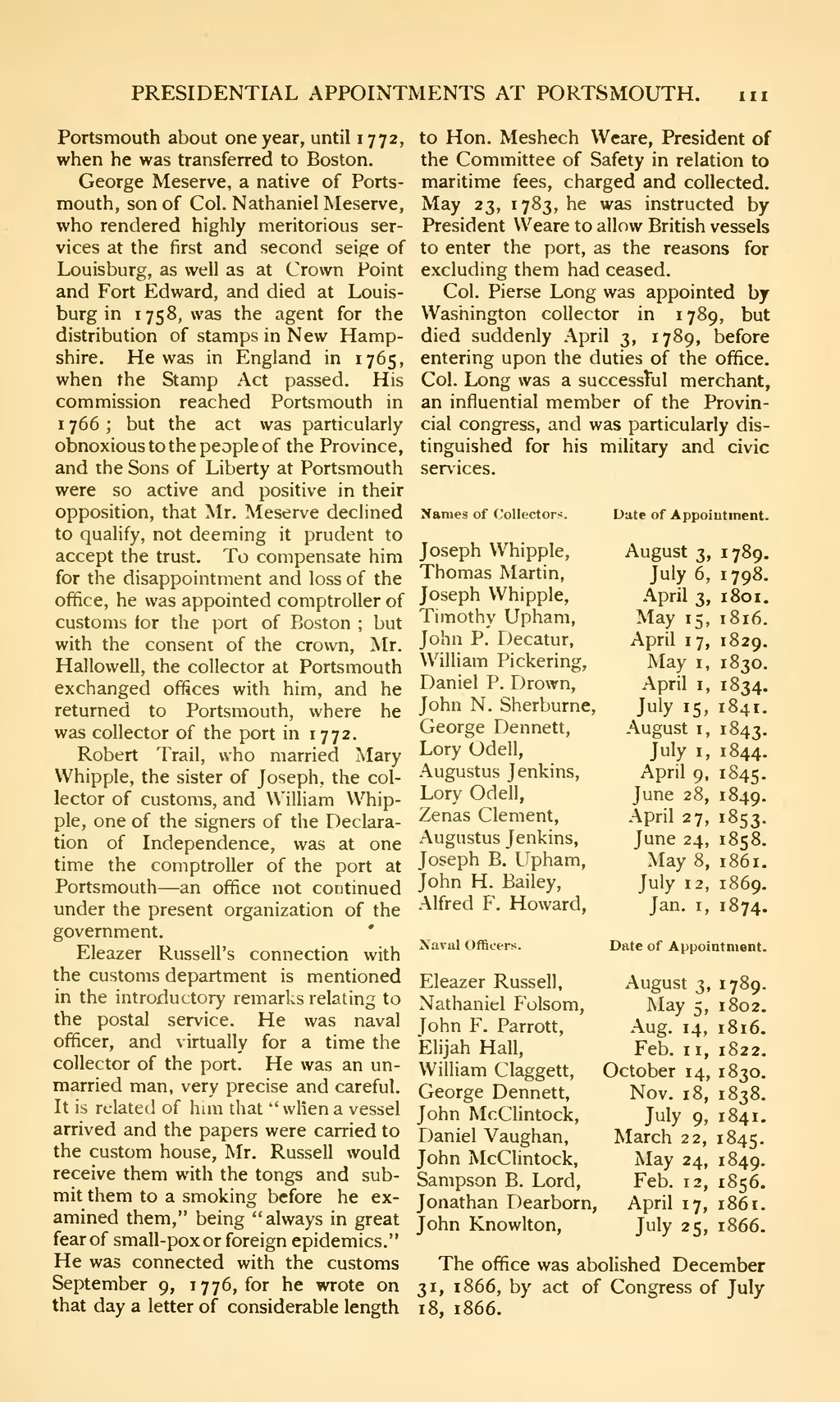PRESIDENTIAL APPOINTMENTS AT PORTSMOUTH.
��in
��Portsmouth about one year, until 1772, when he was transferred to Boston.
George Meserve, a native of Ports- mouth, son of Col. Nathaniel Meserve, who rendered highly meritorious ser- vices at the first and second seige of Louisburg, as well as at Crown Point and Fort Edward, and died at Louis- burg in 1758, was the agent for the distribution of stamps in New Hamp- shire. He was in England in 1765, when the Stamp Act passed. His commission reached Portsmouth in 1 766 ; but the act was particularly obnoxious to the people of the Province, and the Sons of Liberty at Portsmouth were so active and positive in their opposition, that Mr. Meserve declined to qualify, not deeming it prudent to accept the trust. To compensate him for the disappointment and loss of the office, he was appointed comptroller of customs for the port of Boston ; but with the consent of the crown, Mr. Hallowell, the collector at Portsmouth exchanged offices with him, and he returned to Portsmouth, where he was collector of the port in 1772.
Robert Trail, who married Mary Whipple, the sister of Joseph, the col- lector of customs, and William Whip- ple, one of the signers of the Declara- tion of Independence, was at one time the comptroller of the port at Portsmouth — an office not continued under the present organization of the government.
Eleazer Russell's connection with the customs department is mentioned in the introductory remarks relating to the postal service. He was naval officer, and virtually for a time the collector of the port. He was an un- married man, very precise and careful. It is related of him that "when a vessel arrived and the papers were carried to the custom house, Mr. Russell would receive them with the tongs and sub- mit them to a smoking before he ex- amined them," being "always in great fear of small-pox or foreign epidemics." He was connected with the customs September 9, 1776, for he wrote on that day a letter of considerable length
��to Hon. Meshech Weare, President of the Committee of Safety in relation to maritime fees, charged and collected. May 23, 1783, he was instructed by President VVeare to allow British vessels to enter the port, as the reasons for excluding them had ceased.
Col. Pierse Long was appointed by Washington collector in 1789, but died suddenly April 3, 1789, before entering upon the duties of the office. Col. Long was a successful merchant, an influential member of the Provin- cial congress, and was particularly dis- tinguished for his military and civic sen-ices.
��Names of Collectors.
�Date of Appointment.
�Joseph Whipple,
�August 3,
�1789.
�Thomas Martin,
�July 6,
�1798.
�Joseph Whipple,
�April 3,
�1801.
�Timothy Upham,
�May 15,
�1816.
�John P. Decatur,
�April 1 7,
�1829.
�William Pickering,
�May 1,
�1830.
�Daniel P. Drown,
�April 1,
�1834.
�John N. Sherburne,
�July 15 .
�1841.
�George Dennett,
�August 1,
�1843.
�Lory Odell,
�J ul y if
�1844.
�Augustus Jenkins,
�April 9,
�1S45.
�Lory Odell,
�June 28,
�1849.
�Zenas Clement,
�April 27,
�1853-
�Augustus Jenkins,
�June 24,
�1858.
�Joseph B. Upham,
�May 8,
�186 1.
�John H. Bailey,
�July 12,
�1S69.
�Alfred F. Howard,
�Jan. 1,
�1874.
�Naval Officers.
�Date of Appoii
�ltment.
�Eleazer Russell,
�August 3,
�1789.
�Nathaniel Folsom,
�May 5,
�1802.
�John F. Parrott,
�Aug. 14,
�1816.
�Elijah Hall,
�Feb. 11,
�1822.
�William Claggett,
�October 14,
�183O.
�George Dennett,
�Nov. 18,
�1838.
�John McClintock,
�J ul y 9,
�1841.
�Daniel Vaughan,
�March 22,
�1845.
�John McClintock,
�May 24,
�1849.
�Sampson B. Lord,
�Feb. 12,
�1856.
�Jonathan Dearborn,
�April 17,
�l86l.
�John Knowlton,
�J ul y 25,
�1866.
��The office was abolished December 31, 1866, by act of Congress of July 18, 1866.
�� �
